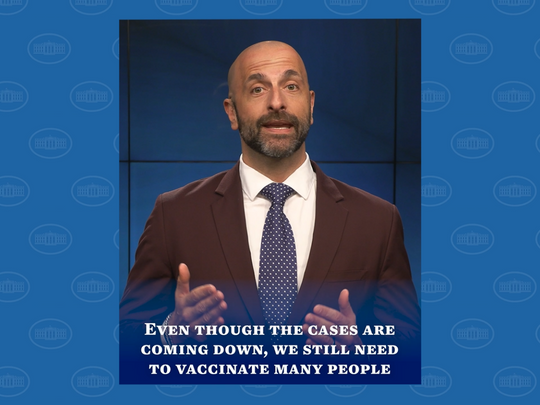Mpox Message for 2023: Integrating Mpox Messaging Into Our HIV Response
Topics
HIV.gov convened a meeting of federal HIV communications leadership to start the new year off with the critical message that integrating mpox messaging into our ongoing communications is foundational to our HIV response for 2023. While we recognize the important work that has been done to dramatically decrease new mpox cases, we cannot take our foot off the pedal, as there is still critical work needed to increase and routinize mpox vaccinations.
We were fortunate to hear about mpox in the context of HIV and the importance of an equity-centered response from White House and other U.S. Government leaders. Demetre C. Daskalakis, MD, MPH, Director, CDC Division of HIV/AIDS Prevention and Deputy Coordinator, White House National Mpox Response noted that mpox continues to be a public health issue that disproportionately impacts people with HIV, and data suggest that approximately 40% of people diagnosed with mpox in the United States also have HIV. He also highlighted important action steps (see below) and resource videos to move us forward.

Beginning the meeting, Kaye Hayes, MPA, Deputy Assistant Secretary for Infectious Disease and Director of the Office of Infectious Disease and HIV/AIDS Policy, emphasized the Biden-Harris Administration’s focus on the importance of equity in the mpox response to ensure that no communities are left behind. She also highlighted the intentionality of the work surrounding mpox, including hearing directly from populations most likely to be affected by mpox but least likely to be vaccinated to better understand what is working and what needs to be improved in our response.
Decline in Mpox Cases
During the meeting, Dr. Daskalakis noted that in the U.S., there has been around a 99% reduction in the number of daily mpox cases since the peak of the mpox outbreak in summer 2022. He attributed this to 1) effective communications to gay, bisexual, and other men who have sex with men, as well as transgender individuals and other gender-diverse individuals; 2) the mpox vaccine; and 3) swift response from the LGBTQI+ community.
Syndemics and Mpox
Dr. Daskalakis also discussed mpox in the context of syndemics, noting that mpox infection does not occur in isolation. The September 2022 CDC Morbidity and Mortality Weekly Report showed that HIV or recent sexually transmitted infections (STIs) are common among people with mpox. Dr. Daskalakis thus stressed the importance of continuing to ensure equitable access to mpox screening, prevention, and treatment, including both prioritizing people with HIV and STIs for mpox vaccination and offering HIV and STI screening for people evaluated for mpox. He also emphasized the need to encourage those who haven’t received their second vaccinations to do so.
“We cannot take mpox in isolation,” he asserted. “We need to put it in the context of the interacting epidemics and the interacting social determinants of health that make mpox worse, or that propel mpox transmission.”
The Way-Forward
Dr. Daskalakis discussed navigating the future of the domestic response to mpox. As of the time of the meeting, there were 1,152,073 U.S. mpox vaccines administered. To get to zero mpox cases, he noted we must focus on communications to increase mpox vaccinations and magnify our communications for mpox vaccine administration. He also encouraged increased engagement with partners via social media, as well as official government websites, such as HIV.gov.
Harold Phillips, Director, The White House Office of National AIDS Policy, offered a closing message to attendees. He noted that the mpox response was “a true demonstration of when we use and follow the data and the science and we center the approach with equity, we CAN make a difference.”
Stay up to date on mpox and view the CDC’s Mpox Vaccine Equity Toolkit and their Cases and Data page. Also watch and share HIV.gov’s mpox videos featuring Dr. Daskalakis answering 14 top mpox questions.